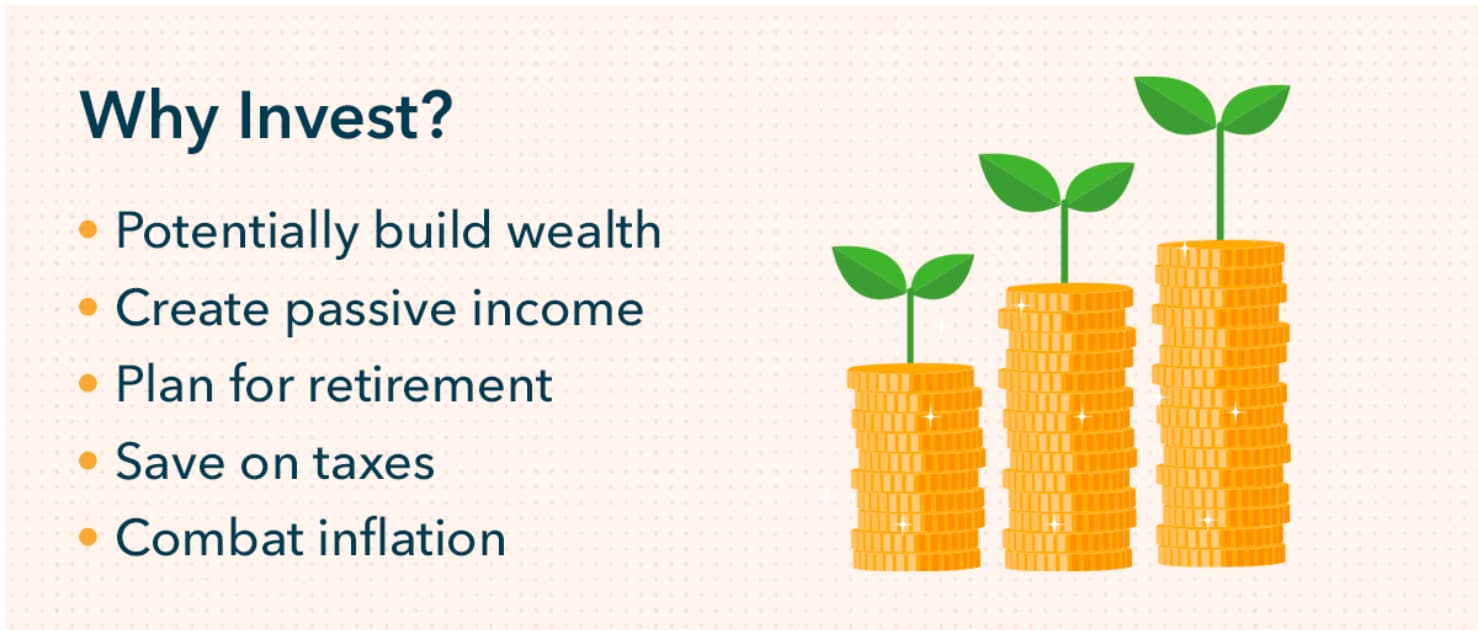Investing 101:
Investing for Beginners
Written by Mint
There’s no doubt that investing can be confusing. You need to know important investment terms, where to invest, the history of the stock market, and so much more. We know that investing can get overwhelming, but the purpose of this chapter is to provide you with a basic understanding of investing, and how beginners can get started
with investments.
Investing is a great way to make money at home without actually doing all that much. Rather than getting a second job or taking on more work, you may be able to earn extra income through investing. This can allow you to focus more on determining the best potential opportunities to invest in.
The money you make from investing can be used for a multitude of purposes. You can use it to plan for retirement. You can use it as an additional source of income. Or you can put it towards accomplishing a life goal, like buying
a house.
Sounds pretty great, right? Investing can be extremely lucrative, but it can also be very risky. So before you go ahead and start investing all of your money, it’s important to have a basic idea of what investing entails, which we’ll be covering below.
In this chapter, we’ll discuss why investing is important, what kind of investment options are available, how much money you may want to consider investing, and more. To learn more about investing for beginners and how it can benefit your life and finances, continue reading the chapter.
Why Is Investing Important?
As you get older, things tend to get more expensive. Gas prices increase, rent goes up, and even grocery shopping is more pricey. This is because of inflation, but one way you may be able to combat inflation is
by investing.
Investing can be a way to grow your wealth and outpace inflation. You’ve probably heard someone say “My investments are going down”, or on the opposite side, “My investments are skyrocketing!” and thought to yourself: “Should I be investing, too?”
In many cases, investing can provide significant benefits, regardless of your age or current financial position. Money management for young people can be difficult, but investing can be a good way to take control of your financial future and feel more secure.
Investing is important for many reasons, such as:

- Potentially build wealth: A great option to consider for building your wealth is investing. Investing your money can give you the opportunity to make more money in return. There are various ways you can consider investing. You can invest in the stock market, real estate, or
retirement accounts. - Create passive income: We know that traditionally, in order to make money, you have to work. But what if there was another way? There is, and it’s called investing. Investments have the potential to create passive income, which is essentially money that is earned from doing little to no active work. Some examples of investments that could generate passive income include rental properties and dividend stocks.
- Plan for retirement: Many people invest as a way to plan for retirement. Options include investing your money into a 401(k) account or another retirement plan that is likely to increase in value over time. If you invest prior to retirement, just imagine how much more money you’ll have saved up when you actually
do retire. - Save on taxes: If you invest the right way, you can also potentially save on taxes. There are various accounts that offer tax advantages, like an IRA and 401(k). The earnings within these accounts are tax-deferred and are usually deductible from your income, which means you could make more money while spending less on taxes in
the short-term. - Combat inflation: Inflation erodes the value of cash and, as a result, raises the prices of goods. Inflation is inevitable, but one way you can potentially fight inflation is by investing. One of the best ways to combat inflation and prepare yourself for the uncertainties of finances is to invest in yourself. Investing in yourself is a way to potentially increase your wealth and save money, despite the inflation that’s occurring beyond
your control.
What Kind of Investing
Is Right for You?
There are many different kinds of investments, so it’s important to choose the type that works for you. When it comes to investments for beginners, you’ll need to know what your risk tolerance is. Some investments are low risk and some
are high risk.

Low risk investments are typically a much safer option and they’re a good place to start for beginners. High risk investments present an opportunity to make more money, but carry a high potential for loss. It’s important to figure out an investment strategy that you’re comfortable with.
Important Factors
to Consider
Before you make any decisions about investing, there are a few important factors that you should keep in mind,
such as:
- Your investment strategy: It’s typically best not to go blind into investing. It can be helpful to have some sort of financial plan that puts into perspective your investment goals and how you’re going to
achieve them. - Your timeframe and risk tolerance: Another important factor to think about when investing is what your timeline looks like and what your risk tolerance is. If your goal is to make a lot of money in the short-term, your investment strategy may look different when compared to someone whose aim is to earn small but steady returns in the long run.
- Where you want to invest your money: There are many different places where you can invest your money based on your investment goals, but it’s also important to consider diversifying your investment portfolio. By diversifying your investments, you have the power to more confidently reduce your risk and maximize
your returns. - How to invest your money: There are two different ways you can approach investing: active investing vs. passive investing. Active investing is a more hands-on approach, while passive investing generally requires less effort. You can make money with both ways, so it’s just a matter of figuring out which one you prefer.
How Much Should You
Be Investing?
The amount of money you should be investing is ultimately a personal preference, but it typically depends on how much money you’re making. Some people recommend putting 10% to 20% of your after-tax income towards investments, but that can differ depending on your particular circumstances.
Where to Make Investments Based
on Age
Someone who’s 25 is probably making very different investment choices than someone who’s 50. In general, age can play a sizable role in the type of investments you make and where you choose to invest your money.
Ages 25-40 is when a lot of people seriously start saving for retirement and looking into investments. At this age, you might focus mostly on the potential growth of stocks in your retirement savings. A Roth IRA or Roth 401(k) may both be good places to start saving
for retirement.
When you’re between 41-56 years old, you might start to take advantage of your contribution limits for your retirement accounts and contribute more money. This is also the time when you may want to consider saving in a taxable account. As you get older, it could also be a good idea to add an allocation to bonds.
When you’re between 57-65 years old, that’s when your retirement savings really start to take effect. At this point, it could be a good idea to broaden your tax diversification with multiple types of accounts and allocate more towards bonds and cash.
Best Investments for Those Just
Getting Started
It’s never too late to start investing. As of 2020 approximately 55% of U.S. adults invest in the stock market as a way to make more money and save for retirement. So if you’re just getting started in investing, consider sticking with the following types
of investments:
- High-yield savings account: This is a very simple and straightforward way to invest and an account can even be opened through an online bank. A high-yield savings account may be a good short-term investment to consider if you are looking to produce
returns quickly. - 401(k) or another retirement plan: If you want to invest as a way to save for retirement, you might consider opening up a 401(k). Many employers also offer to match your 401(k) contributions, which means that your employer will make contributions to your 401(k) plan depending on how much you contribute.
- Mutual funds: Mutual funds may be a smart place to start investing because they’re generally easy to access and give you the opportunity to invest in a basket of stocks or bonds. Mutual funds hold multiple company stocks within one investment, so it can also be a good way to diversify your investment portfolio.
- Certificates of Deposits: Certificates of Deposits, or CDs, can also be good for investment beginners because they offer a fixed interest rate with typically higher, predictable returns and more security.

The Bottom Line: Start Investing Now Rather
Than Later
Learning how to invest can be tricky, but fortunately you can use investment apps for beginners to help you get started. It’s also important to have a basic understanding of the history of money so that you can feel more prepared throughout your
investing journey.
And now that we’ve covered the basics of investments, you should have a better grasp of what investing is and the many ways it can benefit you. But before you can start investing, you’ll need a solid understanding of basic investment terminology, which we’ll be discussing in the next chapter of our investing series.
This is for informational purposes only and should not be construed as legal, investment, credit repair, debt management, or tax advice. You should seek the assistance of a professional for tax and investment advice.
Source: Statista
